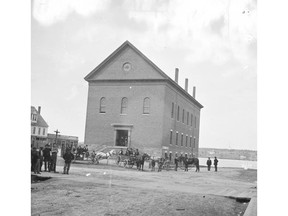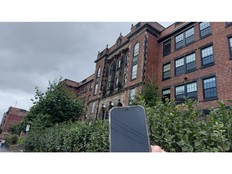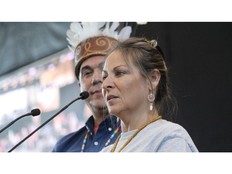Backyard History: Fredericton's flammable city halls
British author Juliana Horatia Ewing had just arrived in the city in time to watch the third city hall go up in flames, only months after the last one, and described an almost carnival atmosphere

Article content
Fredericton enjoys the rather dubious distinction of losing three city halls to fire.
The third Fredericton City Hall inferno was documented in deep – and surprisingly funny – detail by Juliana Horatia Ewing, the celebrated British author. She had only just arrived in Fredericton days earlier, having moved to the city with her husband, a British officer who would be stationed in the city for the next three years.
When the fire broke out on Aug. 31, 1867, the two of them were sound asleep.
They had just returned from a feast held to welcome them to Fredericton. Much to Juliana’s astonishment, since she didn’t cook – she had servants for that – she was gifted vegetables, commenting in a letter to her sister: “…You can’t think of how kind people here are in the matter of vegetables…”
Earlier that day, Bishop Medley and his wife stopped by to bring the Ewings a potted plant and ask them to take care of their house while they were on vacation. It was an unusual request considering they had met only once before.
Fires were a particular worry in every city in New Brunswick back then, as evidenced by how the bishop’s explicit parting instructions to Juliana’s husband, Alexander. In the case of the bishop’s home catching fire, he was to rush in to save a long wooden box.
She wrote that Alexander asked:
“‘Is this valuable?’
‘Very,’ said the bishop.
‘What is it?’
‘Music,’ said the bishop, but Rex didn’t seem to see it.”
It appears Alexander (whom she nicknamed Rex) did understand its value because that night Juliana was awoken by him shouting: “I must save the music!”
She sat up in bed to see the room flooded with flickering light from a fire in Fredericton, later writing: “I could hear the peculiar roar of the fire and see the flames rising up through the open window.”
She added that she hopped out of bed and raced to the window:
“It seems to come from the Medleys, I told Rex. ‘Then I must save the anthems!’ said Rex in a thunderous voice (it was almost amusing!) and off he went.”
She didn’t like being left out of the action, so Juliana went to wake up her servant. “Sarah woke up with much difficulty.”
Now awoken, the servant promptly unsettled Juliana by casually reeling off a list of recent Fredericton fires. She wrote: “The coolness with which people regard being burnt out here is amazing! … Sarah was telling me all sorts of burning-out anecdotes … her former mistress had been burnt out three times … there is a certain man she told me of and wherever he settles fire follows him! It could make a splendid story of it – in the Edgar Poe style!”
The two of them scurried off in the night to find the fire, completely unprepared to not only be helpful, but even to move quickly. Ewing noted that “I had to stop en route to tie up my stockings with handkerchiefs!”
As they went along, they realized it was not the bishop’s home at 79 Church St. that was on fire.
There was actually a considerably larger fire raging downtown.
“As we got nearer,” Ewing wrote “we seemed to be going into the blaze of falling sparks – and at last we found it. We had passed the place an hour or so before! It was a square called Phoenix Square and how many times it has risen from its own ashes I know not, but the other half of the square was burnt down before we came.”
The other half of the square that had burned was actually the ruins of another city hall, which had burned down that May – only three months earlier.
Ewing seemed completely unphased, writing: “When Sarah and I arrived … the flames poured out the window and licked round the walls. It was wonderful!”
While modern readers might think she was acting flippant to the point of being offensive about Fredericton losing yet another city hall to a fire, if anything she seemed to take it more seriously than most Frederictonians. They, apparently, found it hilarious.
One local newspaper led with: “Fredericton presented another claim to the title ‘The City Of Fire’ on Friday night.”
The paper shrugged that virtually no Frederictonians lifted a finger to try and fight the flames, “to the discredit of the citizens.”
According to Ewing’s letter though, there were no buildings close enough for the flames to catch, and city hall was doomed anyway, explaining Frederictonians’ lack of urgency. “An almost comical element was to see the ashes fall about their eyes, going about for a pocket handkerchief, and (wiping soot) all over their faces.”
Perhaps because city halls catching fire was relatively common by this point, Frederictonians began chatting with each other, recognizing friends in the flickering light of the flames. Ewing wrote: “There is something comical in meeting friends in all phases of semi-undress! … Captain Irvine said: ‘We hardly expected to meet again so soon.’”
The most astonishing part is that all three city hall fires were rumoured to be the work of arsonists. The New Brunswick Reporter newspaper alleged the 1850 fire was arson, historian Austin Squires claimed the May 1867 fire was “probably the result of arson,” and Ewing herself claimed this August 1867 fire she watched was “the work of incendiaries!”
Curiously, however, nobody seemed to be the slightest bit bothered by any of this. As Frederictonians mingled around the flames of yet another one of their city halls, Juliana Horatia Ewing wrote that she saw another face she recognized from her dinner party:
“I found there a deaf gentleman we had met at Government House who, like many other deaf people … Is apt to speak almost in a whisper. Amid the din of the fire, he poured a remark into my ear which after much repeating I discovered to be that: ‘We should all require a second supper after all this!’”
Order a signed copy of the Backyard History Book at backyardhistory.ca/book












Postmedia is committed to maintaining a lively but civil forum for discussion. Please keep comments relevant and respectful. Comments may take up to an hour to appear on the site. You will receive an email if there is a reply to your comment, an update to a thread you follow or if a user you follow comments. Visit our Community Guidelines for more information.